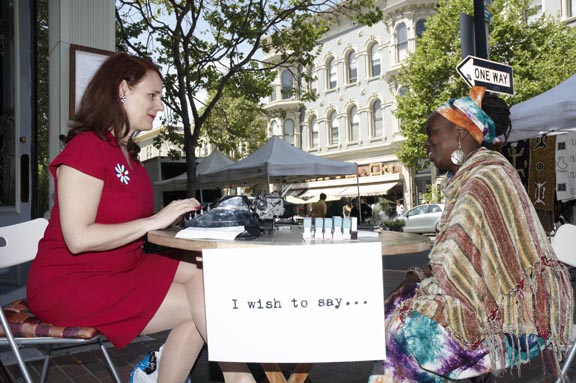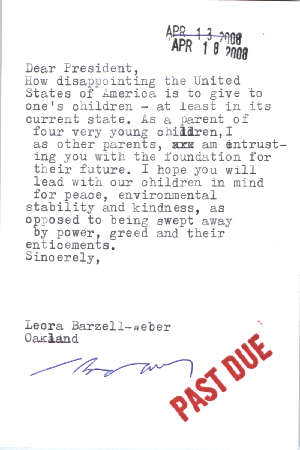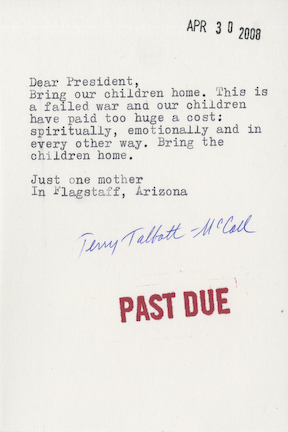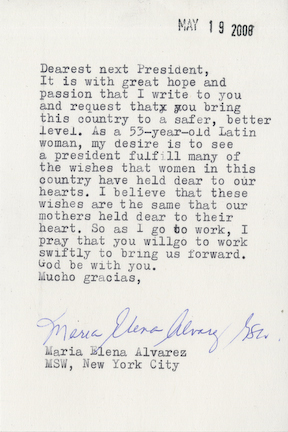Dictating Democracy
Sheryl Oring and "I Wish to Say"
Can art act as a catalyst for social change? In the United States, where freedom of expression is protected by the first amendment of the Constitution, New York-based artist Sheryl Oring encourages U.S. citizens to take advantage of that freedom with her ongoing performance piece I Wish to Say.
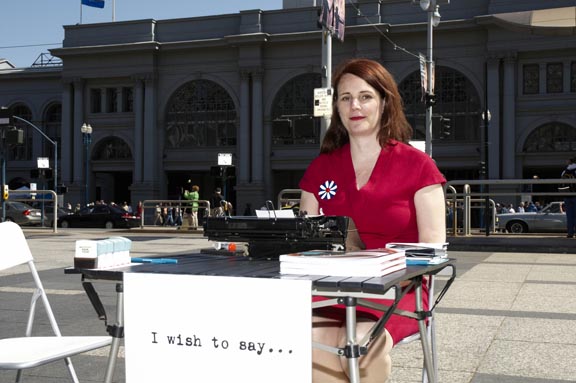
View Larger >
View Larger >
I Wish to Say grew out of my concern that not enough voices were being heard about the state of affairs in this country and my belief in the value of free expression that is guaranteed under our Constitution," the artist writes. "I use art as a form of communication and have done a variety of works in different media that examine issues of free speech, political expression and memory. I enjoy working in public spaces with audiences not typically engaged with the art world."
To date, Oring has performed I Wish to Sayin several dozen cities across America--from New York to San Francisco, Las Vegas to Atlanta, Flagstaff and Memphis, to name a few. Her postcards offer a fascinating glimpse into the diverse political opinions and values held by Americans. Although she has had no reply from the White House to the many hundreds of postcards she's mailed in since 2004, it is clear that I Wish to Say has provided an outlet to many Americans who wouldn't have considered writing to the president themselves.
"Art is a form of communication that can reach some people not typically engaged in politics," Oring says. "For that reason, I feel it can play a significant role in provoking social and political change."
The content of the cards is as varied as the many cities Oring has visited with I Wish to Say, and the many personal and impassioned appeals to the president paint a multi-layered portrait of life in America today.
How did you conceptualize this piece?
This piece grew out of my background as a newspaper reporter and editor, combined with my experience of living overseas from 1997 to 2003. After returning to the United States from Berlin, I felt disconnected from this country. The prevailing view from Germany at the time was that America was filled with war supporters and people who generally backed our national policies. Critics were hard to find, especially in the mainstream media. With this in my mind, I set out to explore American views on the presidency, making a concerted effort to reach out to people not typically quoted in most major daily newspapers.
Have there been common reactions by the public to your presence? Have people reacted differently in different parts of the country?
Curiosity is one of the most common reactions--people want to know what I'm doing and why I'm sitting there with a typewriter all dressed up in vintage clothing. Some people are suspicious, though, and want to know whether I'm associated with one of the political parties (I'm not). A few have told me they'd like to write a card but are afraid of the consequences of sharing their views with the White House.
There were a few parts of the country where people were extremely polite--so much so that they felt they should not express any criticism. Indianapolis and Des Moines come to mind. In places like San Francisco and New York, most people sat down at my desk ready to launch into their take on the presidency--which was often full of criticism.
Why do you dress up as an old-fashioned secretary? How do you think your gender and appearance have affected the public's perception of you?
The outfit and manual typewriter work together to create a scene that is out of the ordinary. This in turn piques people's curiosity. Passersby typically come over to me and ask what I'm doing--and this starts the conversation in a very different way than if I were approaching people first. In all, the setup serves to break down barriers and to invite people in to a special place where they will be heard and where their thoughts will be recorded verbatim. I have often wondered how the communication dynamics would change if I were a man doing this. As a woman, I am probably more approachable for many people.
How eager are people to have their voices heard by the president? Do you think people are more willing to speak to you than to actually write to the president themselves?
People are pretty eager to express their opinions to the White House. When people learn about the project, they are also eager to participate because they are taking part in something that is larger than just themselves. There is also something quite intense and special about the time people spend at my desk. Some have compared the experience to a therapy session, and I think it's because I listen so intently and people really feel "heard."
Do you feel free speech is in danger for U.S. citizens? How important to you think it is for women in particular to make their voices heard?
I have met people who were afraid to express themselves because they felt that doing so would put them in danger. The fact that we have created such an environment is of great concern to me. Because women are underrepresented in most places of power, I feel it's extremely important for them to find ways of making their voices heard.
Sheryl Oring is currently working on an exhibition based on I Wish to Say that will be at the McCormick Freedom Museum in Chicago from November 15 through January 29. For more on the project, visit www.iwishtosay.org, and see Oring's blog about the experience at http://iwishtosay.blogspot.com/. Her book on the project is available athttp://www.neoflix.com/store/i%20w81.


